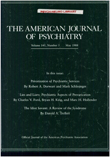Psychotic patients' understanding of informed consent
Abstract
Courts have found psychiatric patients to have the qualified right to refuse treatment. Particularly problematic is whether newly admitted psychiatric patients can comprehend information and give informed consent. The authors examined the ability of voluntary and involuntary psychotic patients to understand information about antipsychotic medication, related this assessment to psychopathology, and evaluated factors involved in hypothetical acceptance or refusal of treatment. Although most patients stated they had understood informed consent material, objective ratings did not support this. Impaired understanding was significantly associated with thought disturbance but did not affect hypothetical acceptance or refusal of antipsychotics. Legal status was not a significant factor.
Access content
To read the fulltext, please use one of the options below to sign in or purchase access.- Personal login
- Institutional Login
- Sign in via OpenAthens
- Register for access
-
Please login/register if you wish to pair your device and check access availability.
Not a subscriber?
PsychiatryOnline subscription options offer access to the DSM-5 library, books, journals, CME, and patient resources. This all-in-one virtual library provides psychiatrists and mental health professionals with key resources for diagnosis, treatment, research, and professional development.
Need more help? PsychiatryOnline Customer Service may be reached by emailing [email protected] or by calling 800-368-5777 (in the U.S.) or 703-907-7322 (outside the U.S.).



